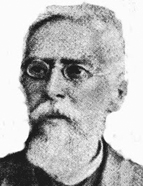

Joaquim Felício dos Santos, a historian, novelist, lawyer, politician, and industrialist, was born on 1 February 1828 in Serro (formerly Vila do Príncipe), Minas Gerais, Brazil. He was the son of Antônio José dos Santos, a former administrator of the Casa de Fundição do Ouro [Gold Foundry House], and Maria Jesuína da Luz. Santos was part of the local economic elite. His family traded in gold and precious stones and exerted great regional political influence in the 19th century. In 1838, his family moved from Serro to neighbouring Diamantina (formerly called Vila do Tejuco). Later, with the mining crisis starting in the 1870s, they invested in the textile industry. The historian completed his first studies in Diamantina. The elementary grades were completed in the municipality of Congonhas do Campo (now Congonhas). Then, in the city of São Paulo, in the neighbouring state, he studied law at the Faculdade de Ciências Jurídicas do Largo de São Francisco [Faculty of Legal Sciences of Largo de São Francisco]. On his return to Diamantina, Santos became a lawyer and taught Maths, Portuguese, French, History and Geography (at the Seminário Episcopal [Episcopal Seminary] and the Ateneu de São Vicente [Athenaeum of São Vicente]).
In 1860, he created the weekly paper O Jequitinhonha (named after an important river in the region). From 1860 to 1864, Joaquim Felício dos Santos mainly published comments critical of the Second Reign, veiled republican articles, historical narratives, and literary productions in the form of pamphlets. After four years out of print, the newspaper returned in 1868 with a more radical tone against slavery, against the monarchy, and more incisively in favour of the republic, until 1872, when it ceased to operate.
This work is financed by national funds through FCT - Foundation for Science and Technology, I.P, in the scope of the projects UIDB/04311/2020 and UIDP/04311/2020.
